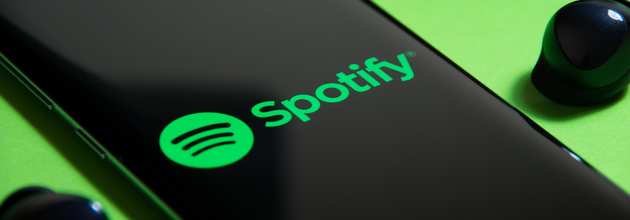 | Read in Browser |
 |
| | Top News  Shutterstock Spotify (NYSE:SPOT) is in damage control mode as listeners, creators and shareholders find themselves on different sides of the fence on what to do about controversial content on its platform. The straw that broke the camel's back was a podcast episode featuring mRNA virologist Dr. Robert Malone on the show of popular host Joe Rogan, who signed a reported $100M deal with Spotify back in 2020. Neil Young, Joni Mitchell and Nils Lofgren have all pulled their music from Spotify in response, while calls to boycott the platform grew on social media with hashtag #DeleteSpotify.
The solution? Looking to pacify both sides of the free speech vs. harmful misinformation debate, Spotify will add a disclaimer to any podcast episode that addresses COVID-19. "This advisory will direct listeners to our dedicated COVID-19 Hub, a resource that provides easy access to data-driven facts, up-to-date information as shared by scientists, physicians, academics and public health authorities around the world, as well as links to trusted sources." Spotify also published platform rules that will govern what content is and isn't allowed on its service, which will be updated regularly to reflect the changing safety landscape.
Rogan is a fan. He likes the advisory instead of a 'misinformation' ban, saying it would allow users to decide their opinion, even if it goes against the current consensus of medical experts. "The problem I have with the term 'misinformation,' is that many of the things we thought of as misinformation a short while ago are now accepted as fact. For instance, eight months ago, if you said 'if you get vaccinated you can still catch COVID and you can still spread COVID' - they would ban you from certain platforms. Now, that's accepted as fact. If you said, 'I don't think cloth masks work' - you'd be banned from social media. Now, that's openly stated on CNN. If you said, 'I think it's possible that COVID-19 came from a lab' - you'd also be banned. Now, that's on the cover of Newsweek."
Go deeper: Shares of Spotify, which commands nearly a third of the global music streaming market, inched into the green overnight, after sliding 12% last week, and erasing more than $3B in market value. The stock has fallen about 26% YTD, 48% over the past 12 months, and hit a 52-week low of $164.41 on Friday amid the controversy. Closest rival Apple Music (NASDAQ:AAPL) was also quick to capitalize on the hullabaloo, highlighting that it was "the home of Neil Young" and his entire catalog was available on the platform. | | Manufacturing Many have been eyeing China's manufacturing numbers in recent months as an important gauge of what to expect along the global supply chain. A weaker figure can suggest that problems will continue to persist, while a stronger number may signal the opposite. On top of the recent headlines, a severe zero-COVID policy is still being implemented in the country, which has driven some 30% of worldwide growth over the past decade.
Fresh data: The private Caixin Manufacturing Purchasing Managers' Index (which focuses on smaller export firms) contracted for the second time in three months in January, falling to 49.1, from 50.9, and close to its lowest point since the start of the pandemic. A separate PMI figure from the official National Bureau of Statistics was slightly less troubling, but still fell to 50.1 in January, from 50.3 a month earlier. That's just above the 50-point threshold that indicates expansion rather than contraction.
"From December to January, the resurgence of COVID-19 in several regions including Xi'an and Beijing forced local governments to tighten epidemic control measures, which restricted production, transportation and sales of manufactured goods," noted Wang Zhe, senior economist at Caixin Insight Group. "It became more evident that China's economy is straining under the triple pressures of contracting demand, supply shocks and weakening expectations."
Outlook: Things don't look any better in the foreseeable future. Factories will likely see an output lull in February as workers head home for the Lunar New Year holiday. Industrial activity has also been impacted by the government's decision to cut steel plant output capacity to reduce air pollution before the Winter Olympics in Beijing. The developments, along with a zero-COVID policy, saw Goldman Sachs last week cut its 2022 forecast for China's economic growth to 4.3%, down from 4.8% previously. | | Featured  Did you know that the S&P US REIT Index is beating the S&P 500 by 10% over the past year?
REITs bring diversity - with minimal risk. They offer income backed by real tangible assets and steady cash flow thanks to long-term leases.
And if you're looking for quality REITs, you may want to consider joining High Yield Landlord.
Their strategy focuses on REITs and other securities trading at bargain valuations – with a target yield of 8%.
Plus this service scores a stellar 5-star rating from 470 member reviews.
Get started today » | | M&A Nearly $1T of U.S. private equity deals were announced in 2021, including buyouts and exits, which is 2.5x the volume of the previous year and more than double the previous peak in 2007. Big leveraged buyouts are continuing apace this year as well, with private equity firms Elliott Management and Vista Equity nearing an agreement to purchase Citrix Systems (CTXS) for about $13B. The company makes software that allows employees of companies to access their network remotely, among other cloud computing capabilities.
Snapshot: As money sloshes around in the markets, private equity institutions have amassed billions of dollars of cash from investors. They need to put that money to work to begin earning fees, and there is no better environment to go big with interest rates still near historic lows. Software companies like Citrix have become desirable targets given their predictable revenue and ability to carry substantial amounts of debt.
Citrix has still had its fair share of difficulties, struggling to transition to a subscription-based model. Converting customers into subscribers (instead of licensees) is better for recurring revenue, though it has had some recent successes, as remote work remains popular even after the pandemic. In November, Citrix reported annualized recurring revenue for its third quarter that expanded 13% Y/Y.
Transaction details: Jointly tapping the loan market, Elliott and Vista plan to fund their cash bid for Citrix at $104 per share. Once taken private, Citrix is expected to be merged with Tibco, another data analytics software firm Vista agreed to buy for $4B in 2014. The combination could attract potential buyers down the line, or shareholders, if the firms decide to return Citrix to public markets. CTXS -4% premarket.
| | Stocks Stock index futures are mixed ahead of final session for January, with contracts linked to the Dow and S&P 500 inching lower, and the Nasdaq up by 0.4%. A spate of volatility continues to unnerve traders and investors alike on Wall Street, with equities rebounding strongly on Friday, closing decisively in the green. Despite the gains, the Nasdaq Composite is headed for its worst month since October 2008 and the worst first month of the year of all time, prompting many to consider whether it is time to "buy the dip" as we head into February:
For: "While it's always hard to predict the bottom of any market selloff, we believe the risk-reward for U.S. stocks is getting attractive," wrote David Lefkowitz, head of equities Americas for UBS Global Wealth Management.
"Market trading is off and the average Nasdaq stock being down over 40% [from last year's all-time high] could create opportunities," said Jonathan Gray, president of Blackstone.
"Innovation is on sale and it will be really important to investors to get to move towards the right side of change, given the amount of disruption that we do expect," according to ARK Invest's Cathie Wood.
"Many of our best investments have emerged when other investors whose time horizons are short term, discard great companies at prices that look extraordinarily attractive when one has a long-term horizon," commented billionaire Bill Ackman, head of hedge fund Pershing Square.
Against: "There's tremendous selling resistance at higher levels because so many people have lost money. And that to me is very similar to the dot-com bubble, and other bubbles," said Morgan Stanley's Andrew Slimmon. "Once a very speculative bubble breaks, it's not a V-bottom because there are too many people looking to get out."
"The buy the dip mentality has been obliterated in the market," declared Bill Gross, the founder and former chief investment officer of PIMCO.
"The buy-the-dip reflex should be resisted in the environment we are likely to continue to face in 2022," added T. Rowe Price CEO Rob Sharps. "Any environment where there is a reversal of accommodating monetary policy makes it more difficult to expect that returns will be robust, and that it is necessarily the right thing to do to buy each pullback."
"We will have much tougher times ahead with extremely low interest rates and a very high stock market, and with increasing - and in some places, accelerating - inflation, we could see a long period of time with low returns," noted Nicolai Tangen, head of Norway's $1.3T oil fund, which is the world's largest sovereign wealth fund. | | Today's Markets In Asia, Japan +1.1%. Hong Kong closed. China closed. India +1.4%.
In Europe, at midday, London +0.1%. Paris -0.2%. Frankfurt +0.7%.
Futures at 6:20, Dow -0.3%. S&P -0.1%. Nasdaq +0.4%. Crude +1% to $87.68. Gold +0.2% at $1790.90. Bitcoin +2.3% to $37324.
Ten-year Treasury Yield unchanged at 1.78%
Today's Economic Calendar | | | | | Seeking Alpha's Wall Street Breakfast Podcast Seeking Alpha's Wall Street Breakfast podcast brings you all the news you need to know for your market day. Released by 8:00 AM ET each morning, it is a quick listen that you can put on as you get ready to start your working day. | | | | |










EmoticonEmoticon